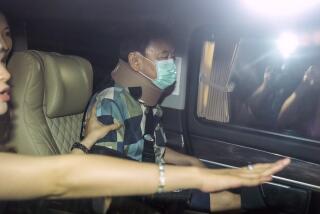Myanmar Party Plans to Test Limits of Freedom
- Share via
YANGON, Myanmar — Leaders of Myanmar’s pro-democracy movement, released Thursday after two weeks of unofficial house arrest, said they will quickly begin political organizing to test the limits of freedom allowed by the military government.
Aung San Suu Kyi and the eight other leaders of her National League for Democracy party had been confined to their homes, denied telephone contact and visits by all but their closest relatives.
A statement from the junta said the party members “are no longer required to stay at their respective residences” and have been allowed to resume “their daily activities as usual.”
Diplomats who previously were blocked from calling on the party leaders made visits Thursday. U.S. charge d’affaires Priscilla Clapp went to Suu Kyi’s house, and Suu Kyi told Clapp that she and other party members were in good health, the U.S. Embassy reported.
Suu Kyi’s party said it will test the government’s sincerity today when it reopens the party headquarters. It had been searched and sealed off by the authorities.
The National League for Democracy’s vice chairman, Tin Oo, said party leaders will also try to travel outside Yangon again for party work.
When Suu Kyi and Tin Oo tried to drive to Kungyangon on Aug. 24, they were stopped by security forces, who brought them back to the capital after a nine-day standoff and then confined the party leaders to their homes.
“We will find out if we will be allowed freedom of movement,” Tin Oo said. “We will travel again because we did not reach Kungyangon last time. So we will try again.”
The restrictions against the party leaders drew international criticism, mainly from the United States and Britain, who accused the regime of violating the Myanmar opposition leaders’ political rights.
In New York, Secretary of State Madeleine Albright told reporters at U.N. headquarters that she was “gratified” that Suu Kyi is now able to receive some people at her residence.
“I do believe that a concerted effort here at the United Nations through a variety of ways to state the international community’s disgust with what the government authorities had done has had some impact,” Albright said.
Secretary-General Kofi Annan also welcomed the developments but repeated his call on the government “to engage in a substantive political dialogue with opposition leaders, including Aung San Suu Kyi.”
The junta had cited an investigation into what it said were the democracy party’s suspected links with terrorists as the reason for imposing the restrictions.
It also described Suu Kyi, 55, the 1991 Nobel Peace Prize winner, as a traitor collaborating with Western nations to destabilize Myanmar. The country, also known as Burma, has been ruled by the military since 1962.
The party’s chairman, Aung Shwe, met Thursday with Lt. Gen. Khin Nyunt, the third-ranking general in the ruling junta, the government statement said.
Khin Nyunt was quoted as saying: “We have very much appreciated the NLD’s understanding of the government’s fundamental obligation and responsibility to protect the rights of all its citizens to a safe, secure and stable environment and to safeguard the national security during the nation’s transition to democracy.”
No further details were available of the rare meeting between the party and the regime, which refused to honor the party’s sweeping 1990 general election victory. The junta also put Suu Kyi under house arrest from 1989 to 1995.
Tin Oo said the 10-minute meeting had no meaning because Suu Kyi was not present.
More to Read
Sign up for Essential California
The most important California stories and recommendations in your inbox every morning.
You may occasionally receive promotional content from the Los Angeles Times.













